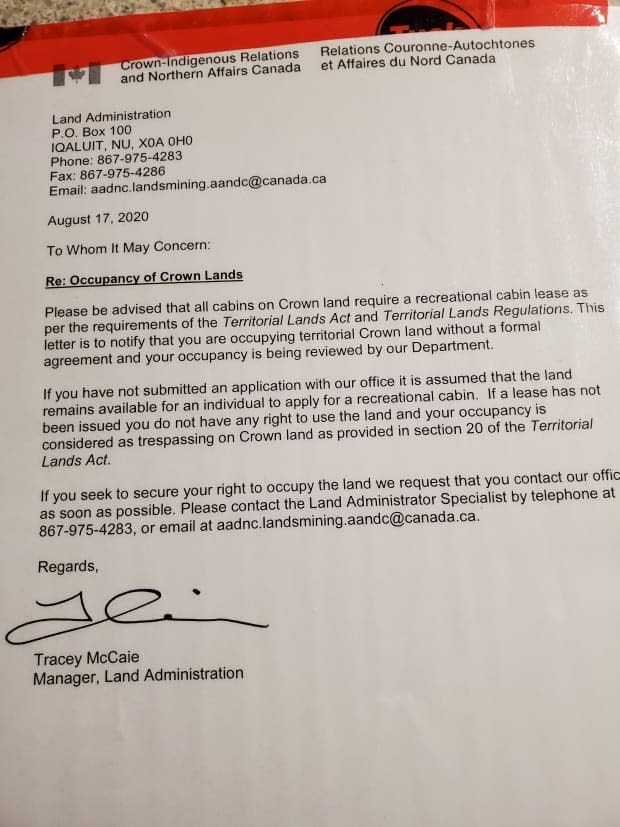Iqaluit cabin owner says he's not trespassing on Crown land
In August, Archie Angnakak found a letter taped to his cabin door saying he needed a lease for the land he has been occupying for about 20 years.
The letter was a notice from Crown Indigenous Relations and Northern Affairs Canada (CIRNAC) notifying him that he needed to apply for a recreational cabin lease because the cabin is on Crown land— about 30 kilometres down the bay from Iqaluit.
Angnakak was going to submit an application for the lease like the letter requested, but reading it back he realized there were several things he took issue with, particularly with the sentence in the letter saying "if a lease has not been issued then you do not have the right to use the land and your occupancy is considered trespassing."
"Saying I don't have a right and that I'm trespassing is totally going against the [Nunavut Land] claim," said Angnakak.
Angnakak wrote a letter back to CIRNAC, outlining his concerns. He wrote the letter posted on his cabin door violates the Nunavut Land Claim Agreement in both "spirit and in law."
Angnakak's letter outlines three reasons for this, the first being the tone of the notice, that it was only posted in English, and the assumption that his cabin is recreational.
Angnakak writes "the aggressiveness and arrogance" of the notification invoked the tone and rhetoric of colonization that has been damaging to Inuit.
He goes on to write that the tone of the letter and the fact that it was only posted in English could be upsetting for unilingual speakers.
"I can't help to think how stressful this must be to many unilingual Inuit cabin owners," he wrote.
Angnakak says only having a post in English is old fashioned and colonial.
Cabin used for hunting
The notice from CIRNAC says the cabin requires a recreational cabin lease, but Angnakak says his cabin is used for hunting.
"It's in a very old, strategic hunting location," he said. "It's an ideal spot for making a trip a lot shorter, less gas, you know?"
In his letter to CIRNAC, Angnakak also highlighted Article 7 of the Nunavut Land Claim Agreement.
Under the article, outpost camps are considered to be in a "particular location on a temporary, seasonal, intermittent, semi-permanent or a year round basis for the purposes of wildlife harvesting and the associated use and enjoyment of lands."
He says because his cabin is in a location closer to the area he hunts in and is able to be used by other hunters, his cabin could fall under this section.
Under Article 7, outpost camps on Crown lands need approval from local Hunting and Trapping Organizations (HTO).
Currently, Angnakak's cabin does not have this approval from the local HTO.

NTI says notice should be withdrawn
Nunavut Tunngavik Incorporated (NTI) agrees that Angnakak's cabin fits the description of an outpost camp.
Angnakak sent copies of his letter to CIRNAC to NTI, the Qikiqtani Inuit Association and the Iqaluit Amaruq Hunting and Trapping Association.
CBC obtained a copy of the letter from David Kunuk, NTI's chief operating officer, written to CIRNAC in response to Angnakak's letter.
"NTI requests that CIRNAC withdraw the notices from Mr. Angnakak and any other similar notices," Kunuk said in the letter from NTI.
The letter said in the Inuit Impact and Benefit Agreement for Territorial Parks, Inuit can occupy cabins in parks without any fees, and that agreement says Inuit have the right to activities like harvesting without any licence, permit, tax or fees.
NTI said in its view, the same rights should apply to land administration by CIRNAC.
"At a minimum, the Crown's ongoing obligation to consult Inuit closely in decision-making," read NTI's letter.
NTI also shared the same concern as Angnakak that the notice was only posted in English.
Angnakak says he is going to apply to register his cabin officially with CIRNAC but wanted to point out his concerns about how he was notified about the cabin lease.
CBC requested an interview with CIRNAC but received a statement saying it is committed to working with the government of Nunavut, NTI, regional Inuit associations and HTO's to "preserve and protect the land across Nunavut."

